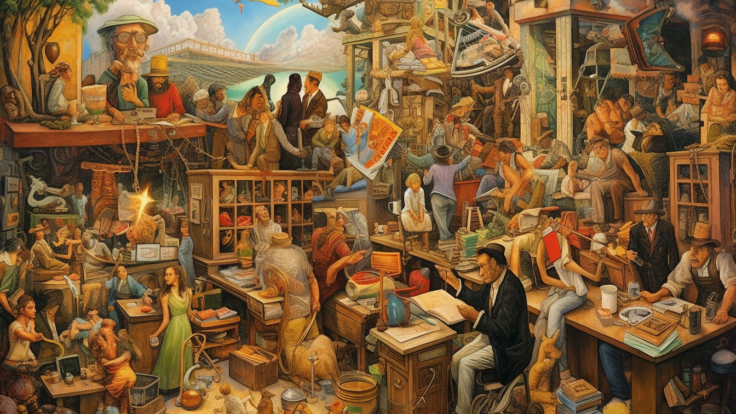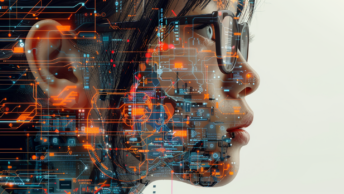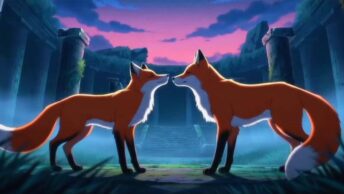Copyright law will strike a major blow against LLMs, and the creator will be the victor.
ChatGPT, Midjourney, and similar tools have sent a ripple effect through society. These tools are built on large language models trained on text, images, audio, and video without the permission of their creators, especially those who work independently and lack the resources to fight for what is theirs.
Just look at the header at the top of this article or elsewhere on my website. For those trained in art history or with connections in modern art communities, you may find similarities to certain artists, recognizing the theft that has taken place.
But that will change following a landmark legal ruling favoring copyright holders.
Companies who trained LLMs on data that was not theirs to use and then monetize those assets will be given a choice: Show you can “untrain” your models or destroy all of the data and start over with Creative Commons sources or license agreements with copyright holders.
But it will not be OpenAI or another company acquiring rights or licenses. Instead, it will be entertainment behemoths like HBO Discovery, Disney, and Comcast. There will be other competitors, for sure. Google, Microsoft, and Apple have the cash to fight too. Perhaps traditional book publishers will get in on this battle.
The FTC is unlikely to allow further consolidation of the entertainment industry, so executives will have to look elsewhere, like advertising agencies, fanfiction sites, YouTube, Instagram, Deviantart, Soundcloud, and other creator platforms.
These platforms are treasure troves containing millions of photos and tens or hundreds of thousands of hours of video, and terabytes of audio and text. All of it is ripe for the plucking, all to be fed into a machine.
The only rule for selling the rights to your Instagram or Deviant art collection of photos and reels will be that you can only sell them once.
The result? Disney can launch Disney AI+. For a modest monthly price, you can generate movies, books, comics, podcasts, television, and films, all with art, stories, music, and voices trained on their vast troves of copyrights. All built around an algorithm that caters to your biases and interests, and influences you to stay home and buy high margin cooperate products customized for you by AI, all so you can drown in your continuous drip of dopamine.
Due to data access limitations, Disney AI+ may provide a different experience to MAX AI+. These companies will still contract out production teams and artists to continue generating specific content to feed the algorithm. So the new fight will be much the same as the old fight. Hiring and retaining creative talent who can strategically develop content that serves algorithmic diversity.
While many will flock to these services, a desire will remain to consume content the old way. We need to consider how expanding the reach of the internet to new areas and higher standards of living will open the doors to reach a more diverse group of people.
That brings us to the creator economy.
This artists’ movement will continue to evolve and grow from what it is today, with opportunities to monetize work via Patreon, affiliates, and traditional advertising. It will also become more centralized, wrapping in authors, musicians, voice actors, illustrators, animators, actors, directors, producers, and others, all contributing to and working to protect the independent ownership of their work.
AI will still exist in this space, but it will be owned and licensed. So writers who want to translate their writing to film can do so easily and quickly by seeking permission from a filmmaker who trained an AI model around their style. This will all be driven by a counsel that makes rules around how and when AI can be implemented.
This leads to the final point. Does this not all sound somewhat similar to what we have today? Ironically, yes. But the issue today is that copyright law has not caught up with how quickly developments in the LLM space have happened. But once they do, we may see tools like ChatGPT and Midjourney turned off or their functions largely constrained to certain functions until they can obtain the data they need.
But how quickly the courts will take up this issue is unknown.
But for now, the future of being a creator will continue to look and feel scary. Many no longer see the point of pursuing illustration, graphic design, writing, and video production, to name a few. Do not let those fears hold you back. Stay the course and continue to build artistic discipline, skills, and confidence.
Maybe you have to take a different job in a non-creative field. Fine, do that. Your time will come again, and your value in society will be revered.
Yes, big media and tech companies will continue to seize more power and ownership that is not theirs. No, the little guy is not down and without a fight.
We can still fight and expand our reach, build communities around our unique brands, help other creators, and flourish by sharing human creativity and passion with those who appreciate the time and effort we put into our art.



